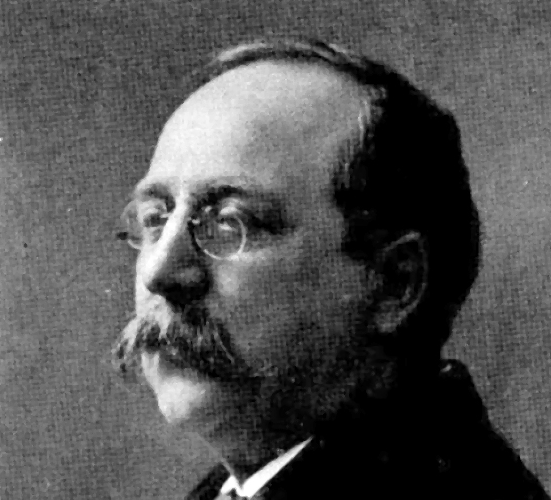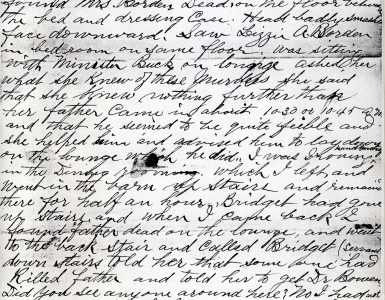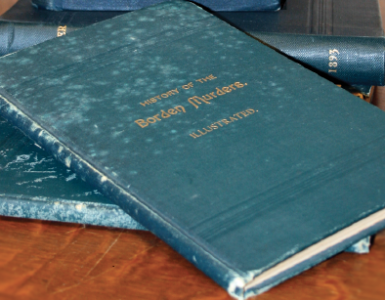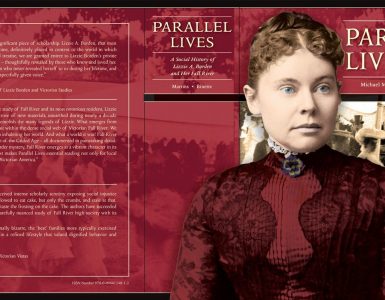by Shelley Dziedzic and Stefani Koorey
First published in Fall, 2009, Volume 6, Issue 2, The Hatchet: Journal of Lizzie Borden Studies.
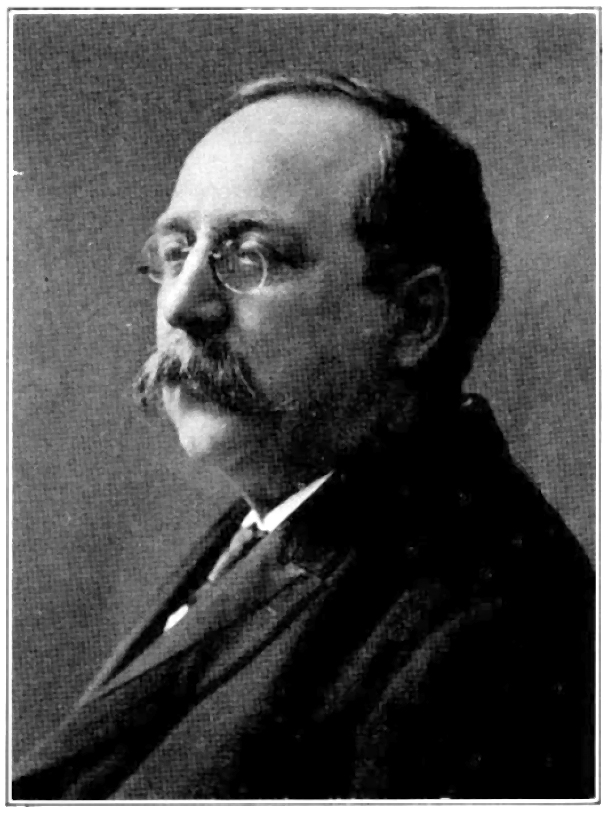
Chances are that if Mrs. Mary Caroline Kelly had not given testimony at the trial of Lizzie Borden, her husband, Michael F. Kelly, and their home next door to the Borden’s house at 240 Second Street would have been forgotten by now. The little Cape Cod-style home, which has had many additions over the years since it was constructed, still stands, painted a buttery yellow as it was when the Kellys moved there in 1891 after their marriage. It is the only residence remaining on Second Street between Spring and Borden from the days of the Borden crimes, besides #92. All other buildings have met the wrecker’s ball. Today, the stores attached to the old Kelly house and the house itself are for sale.
At one point, in the early 1990’s, the Kelly house was a bed and breakfast, long before the Borden house became such a business—it was called Lizzie’s B&B. What is even more ironic is that the Kelly’s second home at 255 Third Street was also named after the famous resident of Second Street—Lizzie’s Third Street Inn, and boasted a large hanging sign out front. The second Kelly home, also still standing, and notable for its enormous size and brown shingles, sits directly behind the first Kelly home on Second Street. Moving was a simple matter of crossing the back yard. The second house was built in 1899. The Kellys, with their children Christopher, Eva, and Mary Philomena, appear in the 1900 census with their seventeen-year-old maid, Miss Austen, at 255 Third Street. By 1917 the house was owned by Thomas Phelan.
In the years between 1890 and his death at age 60 in July of 1916, Dr. Kelly built a career rich in community spirit, compassion for the poor, and service to the city and his church, St. Mary’s, now St. Mary’s Cathedral, on Second Street, just across the street from the Kelly home. Michael Kelly’s life was the American dream for which many emigrants left the old country to follow. His dream was realized in full and passed on in the lives of his children.
Michael Kelly was a scholar plain and simple. He loved learning and books. Born in Ireland April 20, 1856, he attended school there until the age of fourteen. His family arrived in Fall River in 1870. Margaret and William Kelly were brave to make the crossing with their six children: Michael, the eldest (1856), Julia (1860), Patrick (1863), John (1866), Edmond (1868) and Thomas (1870). Another daughter, Bridget, birth date unknown, was born to the couple, sometime after 1880. The 1880 census has the large family living at 27 Union Street in the heart of Fall River. William Kelly found employment at the print works, Julia and John in the cotton mills, while Pat, at the age of 17, worked as a barber’s apprentice. The census also has the two youngest children attending school. Michael Kelly is listed as a student (just having graduated from Holy Cross Class of 1879). The Directory of Deceased American Physicians 1804-1929: A Genealogical Guide, states that Dr. Kelly finished his medical studies at Bellevue Hospital Medical College in 1885, being award his M.D. He then returned to Fall River to assume duties at Fall River City Hospital, Union Hospital, St. Vincent’s Orphan Home and the Seaside Home for Sick Children. He also was a tireless volunteer at St. Anne’s Hospital, as well as at the Union Hospital Training School for Nurses.
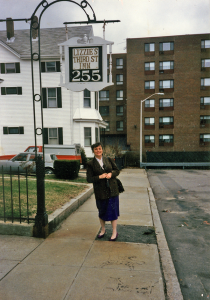
1890 was a big year for Michael Kelly. It was this year that he married Mary Caroline “Carrie” Cantwell at St. Mary’s Church on Second Street. The ceremony was presided over by the rector, Rev. Dr. Hughes. Carrie Cantwell, who was born in Peoria, Illinois, boasted a distinguished family line that included the famous Bishop Cantwell of Mullingar, Ireland—her great uncle. Mrs. Kelly also loved books and the family would soon assemble an impressive library. In 1890, Mayor John Coughlin, also a medical doctor, appointed Michael Kelly to the position of City Physician. The first of their three children, Christopher, was born in December of 1892. Mrs. Kelly was five months pregnant on the day of the Borden crime as she hurried down Second Street on her way to a dentist appointment—nearly an hour late, according to her preliminary hearing testimony, due to a visit by a nurse from the hospital named Miss Murray. Many years later, Caroline would give an interview to Edmund Pearson about that fateful day, and, when it was pointed out that she was the last to see Andrew Borden alive, she quipped, “The last but one!”
There would be two other children—Mary Philomena was born in 1894, followed by Eva J. in 1897. Between the dates of their births, Dr. Michael Kelly was awarded an honorary Master of Arts Degree from Holy Cross in 1896.
A smallpox epidemic ravaged the city of Fall River in 1899, and it was reported that Dr. Kelly spearheaded the effort to bring the epidemic under control, losing only one of his sixty cases. By 1900, and the turn of the new century, the census has the Kelly family in their new home at 255 Third Street, directly behind the yellow cottage where the newlyweds had begun their married life.
Dr. Kelly, a specialist in childhood diseases, also managed to find time to work in the local orphanage, volunteer in many civic causes, serve on the board of several clubs, operate his private practice, and participate in parish church life—all with a young family at home. In addition to his many professional involvements, Michael Kelly was something of a poet. The Boston Pilot, the oldest
Catholic newspaper in America (still published and owned by the Archdiocese of Boston), which gained its popularity through the management of poet and lecturer John Boyle O’Reilly, was a fertile plot for the poetic endeavors of Michael Kelly. According to an interview given by Eva Kelly in the years after her father’s death, Dr. Kelly would entertain his young children with tales of Irish scholars and saints when his office hours had ended. Mrs. Kelly, too, had her collection of stories, full of high drama and inspiration. These golden moments would later serve as a springboard from which Eva Kelly (Betz) would launch a successful writing career. In an interview for catholicauthors.com Ms. Betz said:
Fall River . . . was a splendid place in which to grow up and my home there was a stimulating, warm, welcoming one, always full of life. I came from a family of readers and writers. Talk was good in our dining room where guests from all parts of the world and all walks of life were welcome if they brought interesting conversation. Irish Members of Parliament, bishops, boys and girls from school, authors, travelers,—the list was catholic, lengthy, and constant. . . . my parents, brother, and sister were all intellectual . . .
Eva Kelly Betz became a teacher in Rhode Island, and then later in Fall River, while writing poetry, one-act plays for children, and contributing pieces to teacher’s magazines. She would follow in her father’s footsteps and become civic-minded, organizing the Community Chest, local Girl Scout troops, the local chapter of the National Council of Catholic Women, and volunteered as a driver for the AWVS during WWII, when she and her husband, lawyer Joseph Betz, lived in Passaic, New Jersey. After the war, Eva Kelly Betz wrote popular books for teens and enjoyed a happy family life with her husband and son Peter until her death in 1968. All are buried with Dr. Michael Kelly in Saint Patrick’s Cemetery in Fall River.
The middle child, Mary Philomena, known by her middle name, married Bertrand K. Hart, grandson of Abraham Gifford Hart, a pallbearer for Andrew Borden. Abraham Hart, treasurer of the Union Savings Bank, had something in common with Caroline Kelly—both were among the last to see Andrew Borden alive. Mrs. Charles S. (Clara) Hart, Bertrand’s mother, likewise gave birth to him in 1892. They are buried in the Hart plot at Oak Grove Cemetery just across from the Reverend Augustus Buck, Lizzie’s Congregational Church champion throughout the trial.
Dr. Kelly’s only son, Christopher Cantwell Kelly, pursued a career in real estate and insurance, with an office in the Granite Block. His 1917-1918 draft registration described him as having black hair and gray eyes. Christopher was a WWI veteran. He died June 26, 1919 in Fall River of tuberculosis. He never married and was only 27 at the time of his death.
Three years earlier, Dr. Michael Kelly had died on a Friday, July 28, 1916, after suffering a long illness. Fall River mourned a friend and unstinting servant of the poor. The list of his accomplishments was long and distinguished: Fall River Medical Society, American Medical Association, Massachusetts Medical Society, Knights of Columbus, Fall River Board of Health (two three-year terms), Fall River City Physician, Ancient Order of Hibernians, The Clover Club, President of the United Irish League, the American Historical Society, and an enthusiastic organizer of the annual Saint Patrick’s Day celebration.
According to his obituary in the Fall River Evening Herald (July 29, 1916), Dr. Michael F. Kelly was an impressive man.
Love of native land fired the soul of the physician. As a champion of the cause of Ireland, he was heard from often both by pen and tongue and in the more practical way of contributions. When in health he was a leader of movements for the observance of the feast of the patron saint of the Emerald Isle. No occasion of the kind was allowed to pass without Dr. Kelly being demanded by enthusiastic observers. At one celebration he responded so wittily to the toast ‘The Ladies’ as to surprise his closest friends by his display of eloquence and lightness.
His one diversion in hours of leisure which he extended far into the night, even after a day of hard work, was to sit in his library and commune with the spirits of the great writers. He was an omnivorous and discriminate reader. He was modest in the extreme as regards himself.
It was said that not an Irish politician came through town but that put his feet under Dr. Kelly’s dining room table at the sprawling house on Third Street. A strong advocate of Home Rule for Ireland, Kelly became personally acquainted with every leader of note in Ireland and America.
As his eyes closed at last at 8 p.m. on that Friday evening in the summer house on Main Road in Tiverton, Rhode Island, Dr. Kelly was at rest at last, after struggling with ill health for several years. His Requiem, at St. Mary’s Church, was packed to the rafters with people from all walks of life. Gone at the age of sixty, many would mourn that Michael Kelly had worked himself to an early grave; to the poor he was like a saint on earth.
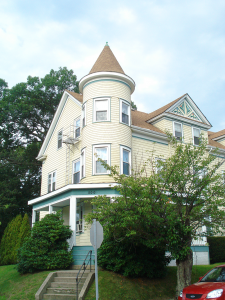
For his grieving family, life would never be the same. His three children and Caroline moved to 500 Weetamoe Street in the north end of the city, the big house on Third Street having been sold between 1916 and 1917. Its spacious rooms, which once rang with laughter, were now silent. Philomena worked as a librarian and Eva taught school until her marriage. Caroline would leave Fall River and make her home in New Jersey with Eva and her grandson, Peter Betz.
Philomena Kelly Hart once recalled her mother’s part in the Borden story and how Caroline and her Irish maid Mary Doolan had locked up the house and peered out from behind the blinds on the day of the murders, while the police rampaged around the yard. They waited for Dr. Kelly to return home from his day trip.
Today, 255 Third Street is again a one-family home, filled with six noisy daughters— the house is bright and filled with life. The little yellow cape on Second Street is rented out to a bustling family with many young children. Dr. Kelly would approve.
“A heart is not judged by how much you love, but by how much you are loved by others.” (Frank Baum, The Wizard of Oz).
Works Cited:
“Eva Kelly Betz,” CatholicAuthors.com. Retrieved on November 28, 2009, from http://www.catholicauthors.com/betz.html
Fall River Evening Herald. July 29, 1916.
Hafner, Arthur, ed. Directory of deceased American physicians, 1804-1929. Chicago: American Medical Association, 1893.


